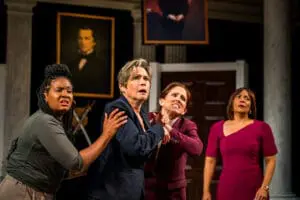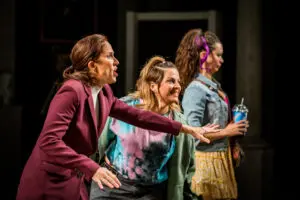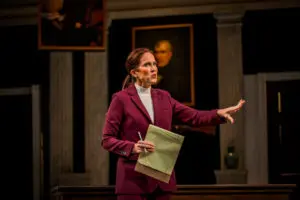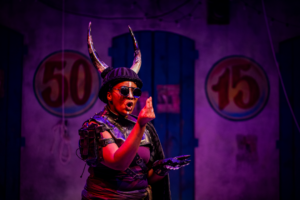Interview with Jessica Johnson and Karen Peakes from ‘POTUS’

Jessica Johnson (Chris), Susan Riley Stevens (Harriet), Karen Peakes (Jean), and Rachel Leslie (Margaret) in Arden Theatre Company’s 2024 production of POTUS: Or, Behind Every Great Dumbass are Seven Women Trying to Keep Him Alive. Photo By Ashley Smith, Wide Eyed Studios.
Q: What was your first Arden play experience?
Karen Peakes: My first experience was seeing Major Barbara in the small space. I think that was before the big space was available, and it was Scott Greer, Jen Childs and Grace Gonglewski. I was like, ‘Oh my God.’ It just felt so exciting, because, I think I was still in college when I saw it, and it was like this, ‘that’s it’. That’s what I want to do, and that’s what I’m on track to hopefully do. So that was really cool. And then my first play at the Arden was The Boxcar Children, which is a children’s show, a long time ago.
Q: How does it feel to have done both mainstage and children’s theater at The Arden?
Karen: I look at children’s theatre, at least the ones I have been in, as I look at any show I have been in. I think it’s so amazing. I love children’s theatre. I love doing children’s theater because I just think it’s so important. Not necessarily for like building future actors or anything, but just the imagination of it all. And I think the children’s theater audiences are some of the most exciting I’ve ever been a part of. So, I approach it in the same way I would a regular show, like for adults. I try and make it as real and as fully fleshed out as possible. And sure, it’s going to have some sillier moments, maybe, and some more caricaturing bigger moments, but as long as it’s grounded in some kind of reality and respect, you know, you’re not dumbing it down. And I think that’s what The Arden does really well with the Children’s Theater, [it’s] not dumbed down. It’s like: ‘Here’s a beautiful story. Let’s share it in a way that is accessible to where you are in your life right now.
Q: How many shows have you done at The Arden?
Karen: I [have done] a few shows. I’ve done: The Boxcar Children, A Prayer for Owen Mean, 12th Night, A Little Night Music. And now POTUS. So five. This is my fifth show.
Q: Is there any one show that particularly stands out?
Karen: A Prayer for Owen Meany was a really special show. My husband was in it as well. Well before we got cast in that play, it was one of our favorite books together as a couple. And we actually named our son, Owen, who hadn’t been born at that point. Owen is a really special name for us, and so, and the play, the story is so beautiful. That was a really special one.

Karen Peakes (Jean), Kimberly Gilbert (Bernadette) and Alia Munsch (Dusty) in Arden Theatre Company’s 2024 production of POTUS: Or, Behind Every Great Dumbass are Seven Women Trying to Keep Him Alive. Photo By Ashley Smith, Wide Eyed Studios.

Karen Peakes (Jean) in Arden Theatre Company’s 2024 production of POTUS: Or, Behind Every Great Dumbass are Seven Women Trying to Keep Him Alive. Photo By Ashley Smith, Wide Eyed Studios.
Q: Tell us about your experience working at the Arden.
Karen: One of the things that I love about working at the Arden is its location. It’s in the heart of Old City, and it just feels so like, immediately, like you’re part of the theater community, and the sort of buzz of the city. And it’s just a really exciting place to come to work every day. I’ve always loved this area, and The Arden was one of the first places that I saw theater in Philly, and so it feels like this electricity to get to come to work here.
For me, there’s like an aliveness to this theater. When we were in rehearsal at the Hamilton, the fact that we could hear the children-there were camps going on, almost the entire rehearsal process, if not, the whole time. Doing this play, doing any play in our environment, but particularly this one, where we’re shouting these obscenities. It’s also a hopeful play, and then having these little children voices and seeing their parents. It was just very vibrant and felt like a living institution in a way that was really exciting.
Q: What has been your motivator to keep your energy up throughout POTUS?
Jessica Johnson: That’s a good question. How do we keep the energy up? Caffeine. Adrenaline. Fear.
Karen: Adrenaline, fear. Yeah. We have to do our job and we all know that. And at the end of the day, we’re all super professional and we are perfectionists. I think each of us want it to do well because we’re still talking about moments [that], ‘Oh, that doesn’t work anymore. Can we do this and this?’ And we still check in about stuff almost every day. And that’s part of it. And the fact that with this show in particular, the audiences are so varied, the responses are so varied, and that’s part of keeping the energy up because we don’t know what we’re going to get. And so it’s a little bit exciting and scary every time, and that helps. Fear is a really good motivator. laughs
Jessica: A motivator I also find there’s joy in being like, ‘Oh, they found that funny for some reason today.’ We should change a thing or we made this adjustment. And boom, now it worked. The joy of it, even when you’re tired, knowing that this is what we get to do and that there are people who make their way to the theater to sit in a dark room, it’s still really a magical thing to think theater still happens. I know that we talk about theaters dying, but that can’t be true because people are still here.
To be able to do something like this. To do a show that is foundationally a farce and alongside so many strong performers, and to be able to continue to ask questions and to stay vigilant and curious, I think is at the end of the day, I’m going to have this coffee and we’re going to figure it out. And also when the audience is there, you’re like, it’s time. These people don’t know this story. They’ve never been here before. it will feel so good to know that somebody got a little giggle or a little tickle or felt so motivated to come here to hear a story that either reflects their experience or they experienced something uncomfortable and stayed and sat with it.

Jessica Johnson (Papa Ge) in Arden Theatre Company’s 2024 production of Once on This Island. Photo By Ashley Smith, Wide Eyed Studios
Q: What was the first play you were in at The Arden? Tell us more about how you got here.
Jessica: The first play that I was in was a piece called The Legend of Georgia McBride. It was not on the main stage. It was in the Arcadia. I’d never done a comedy. I actually remember receiving a call like, ‘Hey, are you sure you can’t come play with us, come audition?’ And I was like, ‘Nah, I actually don’t act anymore.’ I was living in Virginia and decorating cakes and things. It was so random. And I came up for the audition and then they gave me a call the next week and I was here. I remember being like, ‘Wow, I feel out of my depth’ because I don’t know comedy. These people are so funny. They’re such clowns. And I learned so much.
I think it was just getting that professional experience under my belt to be in a space where I so admired the work was it just really shifted some things. It was like, ‘This is all possible. This is all available to you.’ And even if there aren’t very many roles, and there weren’t many people within the community at the time to connect with that shared in terms of representation and experience like mine, it was a point of connection to meet young performers of color, Mikéah Ernest Jennings, God rest his soul.
He was integral to continuing to be an actor. I remember telling him once when we were backstage for Georgia McBride, ‘I’ll do this and then I’m going to go back to Virginia and I’ll just be there.’ And he was like, ‘Girl, you are an actor.’ In fact, he didn’t say ‘girl’. He was like, ‘SIS, you’re an actor’. He’s like, ‘Do you want it? You just got to figure it out. Because it’s there for you. It is available to you.’ And God bless him for that, for being put on my path at that time because of the Arden.
And Terry was also really funny because I remember we were working on a scene-we were in previews. I remember Terry pulling me aside and he said, ‘You know what you’ve got?’ And I was like, ‘No, I don’t even know.’ He’s like, ‘You got grit’. And I was like, ‘I do have grit.’ And still, that is true. It does take a level of grit to be like somebody said no, someone else is going to say, yes, I’m going to stay curious about this. I’m going to stay open to this and excited. It’s hard. But there are opportunities and there are places where you can grow and do the work. Being in spaces like The Arden has allowed me, who didn’t get to go to graduate school, an opportunity to continue to learn because people want to come here, they want to play, they want to find the strongest choice, how to make [the work] better.
Q: From your point of view, how do you feel the Arden Theatre contributes to creating shared experiences and opportunities for artists and audiences as the city’s theater scene evolves?
Jessica: I think the thing that’s really lovely about the Arden is that it’s here not just to push us as artists, as creatives, as makers of theater. It’s here to challenge the audience. It’s here to bring us together, to put us all on the same page and say, this is the language, this is the setting. These are the places and the people. Are you ready to take this journey with us? What is it that’s stirring in you?
[This is an] opportunity for all of us to come together and take this journey and to acknowledge that we may not come with the same experiences and even come in on that day on the same page. Who knows what day you were having before you got here, but We get to have this moment together and we’re going to learn something about ourselves. Whether it be we do not appreciate that language, or actually that was pretty funny. Or you know what, that was funny. But it makes a very good point to really sit together with that. It is a magical opportunity.
Audio has been edited for clarity and to remove interruptions.
